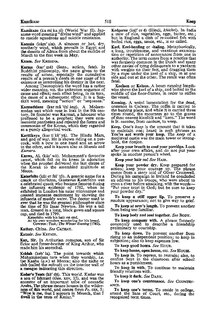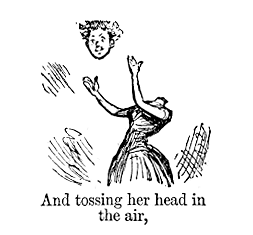
Rhyming slang is a form of slang word construction in the English language. It is especially prevalent in the UK and Australia. It was first used in the early 19th century in the East End of London; hence its alternative name, Cockney rhyming slang. In the United States, especially the criminal underworld of the West Coast between 1880 and 1920, rhyming slang has sometimes been known as Australian slang.
Anger, also known as wrath or rage, is an intense emotional state involving a strong uncomfortable and non-cooperative response to a perceived provocation, hurt or threat.

An idiom dictionary is a dictionary or phrase book that lists and explains idioms – distinctive words or phrases having a figurative meaning that goes beyond the original semantics of the word(s). For example, the phrase "keep your breath to cool your porridge" is more likely to be a rebuke to mind your own business than literal advice at breakfast.

A cliché is a French loanword expressing an element of an artistic work, saying, or idea that has become overused to the point of losing its original meaning or effect, even to the point of being trite or irritating, especially when at some earlier time it was considered meaningful or novel. In phraseology, the term has taken on a more technical meaning, referring to an expression imposed by conventionalized linguistic usage.
This is a list of British words not widely used in the United States. In Canada, New Zealand, India, South Africa, and Australia, some of the British terms listed are used, although another usage is often preferred.
You can't have your cake and eat it (too) is a popular English idiomatic proverb or figure of speech. The proverb literally means "you cannot simultaneously retain your cake and eat it". Once the cake is eaten, it is gone. It can be used to say that one cannot have two incompatible things, or that one should not try to have more than is reasonable. The proverb's meaning is similar to the phrases "you can't have it both ways" and "you can't have the best of both worlds."

A changeling, also historically referred to as an auf or oaf, is a human-like creature found in folklore and folk religion throughout Europe. A changeling was believed to be a fairy that had been left in place of a human stolen by the fairies.
Penelope Jane Leach, is a British psychologist who researches and writes extensively on parenting issues from a child development perspective.
"Hold your horses", sometimes said as "Hold the horses", is an English-language idiom meaning "wait, slow down". The phrase is historically related to horse riding or travelling by horse, or driving a horse-drawn vehicle. A number of explanations, all unverified, have been offered for the origins of the phrase, dating back to usage in Ancient Greece.
"Break a leg" is a typical English idiom used in the context of theatre or other performing arts to wish a performer "good luck". An ironic or non-literal saying of uncertain origin, "break a leg" is commonly said to actors and musicians before they go on stage to perform, likely first used in this context in the United States in the 1930s or possibly 1920s, originally documented without specifically theatrical associations. When said at the onset of an audition, "break a leg" is used to wish success to the person being auditioned.

"The pot calling the kettle black" is a proverbial idiom that may be of Spanish origin, of which English versions began to appear in the first half of the 17th century. The idiom is glossed in the original sources as being used by a person who is guilty of the very thing of which he accuses another and is thus an example of psychological projection, or hypocrisy.
To kick the bucket is an English idiom, considered a euphemistic, informal, or slang term meaning "to die". Its origin remains unclear, though there have been several theories.

An idiom is a common word or phrase with a figurative, non-literal meaning that is understood culturally and differs from what its composite words' denotations would suggest; i.e. the words together have a meaning that is different from the dictionary definitions of the individual words. By another definition, an idiom is a speech form or an expression of a given language that is peculiar to itself grammatically or cannot be understood from the individual meanings of its elements. For example, an English speaker would understand the phrase "kick the bucket" to mean "to die" – and also to actually kick a bucket. Furthermore, they would understand when each meaning is being used in context.
It takes two to tango is a common idiomatic expression which suggests something in which more than one person or other entity are paired in an inextricably-related and active manner, occasionally with negative connotations.
Teaching (your) grandmother to suck eggs is an English language saying that refers to a person giving advice to another person in a subject with which the other person is already familiar.

"Don't throw the baby out with the bathwater" is an idiomatic expression for an avoidable error in which something good is eliminated when trying to get rid of something bad, or in other words, rejecting the favorable along with the unfavorable.

Have a nice day is a commonly spoken expression used to conclude a conversation, or end a message by hoping the person to whom it is addressed experiences a pleasant day. Since it is often uttered by service employees to customers at the end of a transaction, particularly in Israel and the United States, its repetitious and dutiful usage has resulted in the phrase developing, according to some journalists and scholars, especially outside of these two countries, a cultural connotation of impersonality, lack of interest, passive–aggressive behavior, or sarcasm.
"You kids get off my lawn!" is an American expression of the late 20th century and early 21st century. Slight variations including "Get off my lawn!""Get off my damn lawn!" and "You kids get out of my yard!" are common. This phrase presents the supposed reaction of a stereotypical elderly homeowner confronting boisterous children entering or crossing their property. Today, the phrase has been expanded to mock any sort of complaint, particularly those of older people regarding the young.
Lugbara proverbs locally known as E'yo O'beza refers to wisdom from the Lugbara people passed down by grandparents, parents and other relatives to younger generations since time immemorial through stories, parables, idioms and simple phrases, usually around a bon fire. In modern times though, due to formal education, it's not a celebrated activity but elders still teach and advise the young in their day to day encounters. Below are some examples and : meaning.
Kick the cat is a metaphor used to describe how a relatively high-ranking person in an organization or family displaces their frustrations by abusing a lower-ranking person, who may in turn take it out on their own subordinate.







